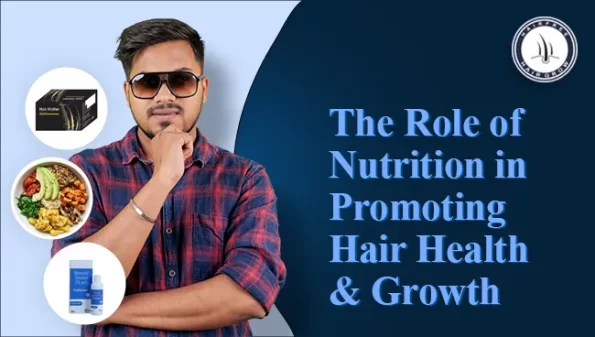Before delving into the role of nutrition, it’s essential to understand the structure of hair. Each hair strand is composed of a protein called keratin, which is responsible for its strength and durability. The hair follicles, located beneath the scalp, play a vital role in hair growth. A healthy scalp and nourished hair follicles are key factors in maintaining vibrant and strong hair. Prioritizing hair health and growth through proper care and nutrition can lead to stronger, more vibrant locks.
The Importance Of Nutrition For Hair Health
Proper nutrition is crucial for maintaining healthy hair. It provides the necessary building blocks for hair growth, strengthens the hair shaft, and improves overall hair quality. Both macronutrients and micronutrients contribute to the health of our hair.
Macronutrients
Macronutrients, including proteins, carbohydrates, and fats, are the primary sources of energy for our bodies. They provide the foundation for healthy hair growth and repair.
Proteins
Hair is primarily composed of a protein called keratin. Therefore, consuming an adequate amount of protein is essential to maintain strong and healthy hair. Good sources of protein include lean meats, poultry, fish, eggs, legumes, and dairy products.
Carbohydrates
Complex carbohydrates, such as whole grains, fruits, and vegetables, provide energy for the body and support hair growth. They also contain essential vitamins and minerals that nourish the hair follicles.
Fats
Healthy fats, especially omega-3 fatty acids, are essential for maintaining scalp health and promoting hair growth. Sources of omega-3 fatty acids include fatty fish (salmon, mackerel), avocados, nuts, and seeds.
Essential Nutrients For Healthy Hair Growth
Several key nutrients play a significant role in promoting healthy hair growth. Let’s explore each of them in detail:
Protein
As mentioned earlier, hair is predominantly composed of protein. Consuming an adequate amount of protein-rich foods helps build and repair hair cells. Lean meats, fish, eggs, legumes, and dairy products are excellent sources of protein.
Omega-3 Fatty Acids
Omega-3 fatty acids are essential fats that promote scalp health and prevent dryness and flakiness. They can be found in fatty fish like salmon and mackerel, as well as in plant-based sources such as avocados, nuts, and seeds.
Biotin
Biotin, also known as vitamin B7, is a crucial nutrient for hair growth. It helps in the production of keratin and enhances hair elasticity. Foods rich in biotin include eggs, nuts, seeds, sweet potatoes, and spinach.
Iron
Iron deficiency is often linked to hair loss and thinning. Including iron-rich foods like lean meats, spinach, lentils, and fortified cereals in your diet can help prevent hair problems caused by iron deficiency.
Vitamin D
Vitamin D is essential for hair follicle cycling and plays a role in hair growth. Exposure to sunlight, fortified dairy products, eggs, and fatty fish are good sources of vitamin D.
Vitamin E
Vitamin E is an antioxidant that helps improve scalp circulation, promoting healthy hair growth. It can be obtained from sources like almonds, spinach, sunflower seeds, and avocados.
Zinc
Zinc plays a vital role in hair tissue growth and repair. Oysters, beef, pumpkin seeds, and lentils are rich sources of zinc.
Vitamin A
Vitamin A helps the scalp produce natural oils, keeping the hair moisturized and preventing dryness. Carrots, sweet potatoes, kale, and spinach are high in vitamin A.
Vitamin C
Vitamin C aids in collagen production, which is essential for hair strength. Citrus fruits, strawberries, bell peppers, and broccoli are excellent sources of vitamin C.
Selenium
Selenium is an essential mineral that helps prevent oxidative stress and maintain a healthy scalp. Brazil nuts, tuna, and whole grains are good sources of selenium.
Food Sources Of Hair-Boosting Nutrients
To obtain the necessary nutrients for healthy hair, it’s essential to include a variety of foods in your diet. Here are some examples:
- Protein: Lean meats, poultry, fish, eggs, legumes, and dairy products.
- Omega-3 Fatty Acids: Fatty fish (salmon, mackerel), avocados, nuts, and seeds.
- Biotin: Eggs, nuts, seeds, sweet potatoes, and spinach.
- Iron: Lean meats, spinach, lentils, fortified cereals.
- Vitamin D: Sunlight exposure, fortified dairy products, eggs, fatty fish.
- Vitamin E: Almonds, spinach, sunflower seeds, avocados.
- Zinc: Oysters, beef, pumpkin seeds, lentils.
- Vitamin A: Carrots, sweet potatoes, kale, spinach.
- Vitamin C: Citrus fruits, strawberries, bell peppers, broccoli.
- Selenium: Brazil nuts, tuna, whole grains.
The Impact Of Hydration On Hair Health and Growth
Proper hydration is crucial for maintaining healthy hair. Water helps transport essential nutrients to the hair follicles and keeps the scalp hydrated. It is recommended to drink an adequate amount of water daily to support hair health.
Healthy Hair Habits
In addition to proper nutrition, adopting healthy hair habits can contribute to overall hair health and growth. Consider the following practices:
Avoiding Crash Diets
Extreme and restrictive diets can deprive the body of essential nutrients, leading to hair problems. It’s important to maintain a balanced and varied diet to provide the necessary nourishment for healthy hair.
Balancing Nutrient Intake
While individual nutrients are essential, it’s important to maintain a balanced intake of all essential nutrients. A well-rounded diet that includes a variety of foods ensures the availability of different vitamins and minerals necessary for optimal hair health.
Incorporating Supplements
In some cases, dietary supplements may be beneficial to fill in nutrient gaps. However, it’s advisable to consult with a healthcare professional before starting any supplements to determine the appropriate dosage and suitability for individual needs.
Limiting Processed Foods and Sugar
Processed foods and excessive sugar consumption can negatively impact overall health, including hair health. It’s best to limit the intake of processed foods and opt for whole, nutrient-dense foods instead.
Managing Stress Levels
Chronic stress can contribute to hair problems such as hair loss and thinning. Engaging in stress-reducing activities like exercise, meditation, and adequate sleep can promote healthy hair growth.
Protecting Hair from External Damage
Using heat styling tools, chemical treatments, and excessive brushing can damage the hair shaft. It’s important to handle the hair gently, use heat protectants, and minimize exposure to damaging practices.
Conclusion
Nutrition plays a vital role in promoting hair health and growth. Consuming a balanced diet rich in essential nutrients, such as protein, omega-3 fatty acids, biotin, iron, vitamins D and E, zinc, vitamin A and C, and selenium, provides the necessary building blocks for healthy hair. Additionally, adopting healthy habits, staying hydrated, and minimizing external damage contribute to overall hair well-being. By prioritizing nutrition and taking care of our hair, we can maintain its strength, shine, and vitality.
FAQs (Frequently Asked Questions)
Can nutrition alone solve hair loss problems?
While nutrition plays a crucial role in maintaining healthy hair, hair loss can be caused by various factors. Nutritious eating can support hair health, but it’s important to consult a healthcare professional to identify and address the underlying causes of hair loss.
Are there any specific diets recommended for promoting hair growth?
There is no specific diet exclusively for hair growth. However, following a balanced diet that includes a variety of nutrient-rich foods can contribute to optimal hair health and growth.
How long does it take to see improvements in hair health through nutrition?
The timeline for visible improvements in hair health varies for each individual. It generally takes a few months to notice significant changes, as hair growth is a slow process. Consistency in maintaining a healthy diet and lifestyle is key.
Can excessive intake of certain nutrients negatively affect hair health?
While adequate intake of nutrients is essential, excessive amounts can sometimes have adverse effects. It’s important to maintain a balanced approach and avoid excessive supplementation without professional guidance.
Is it necessary to consult a healthcare professional before making dietary changes for hair health?
It’s advisable to consult a healthcare professional, especially if you have underlying health conditions or specific concerns regarding your hair health. They can provide personalized recommendations based on your individual needs and guide you in making informed dietary changes.
Written By
MBBS, MD
Dr. Pratibha Pradhan is a seasoned dermatologist and trichologist specializing in hair health and aesthetics. With over 12 years of experience, she combines medical expertise with a passion for enhancing natural hair quality. Her evidence based deep knowledge in understanding nutrients requirements for hair health is remarkable and ensures patients receive tailored treatments for any kind of hair problems. 🌟🔬
Disclaimer
We’ve made all possible efforts to ensure that the information provided here is accurate, up-to-date and complete, however, it should not be treated as a substitute for professional medical advice, diagnosis or treatment. See Detailed Disclaimers Here.



